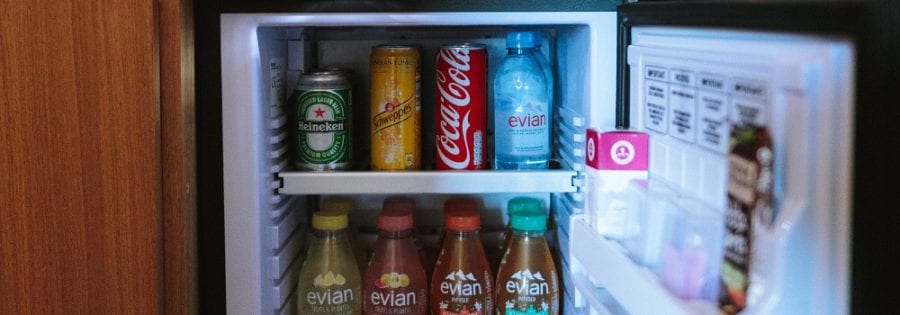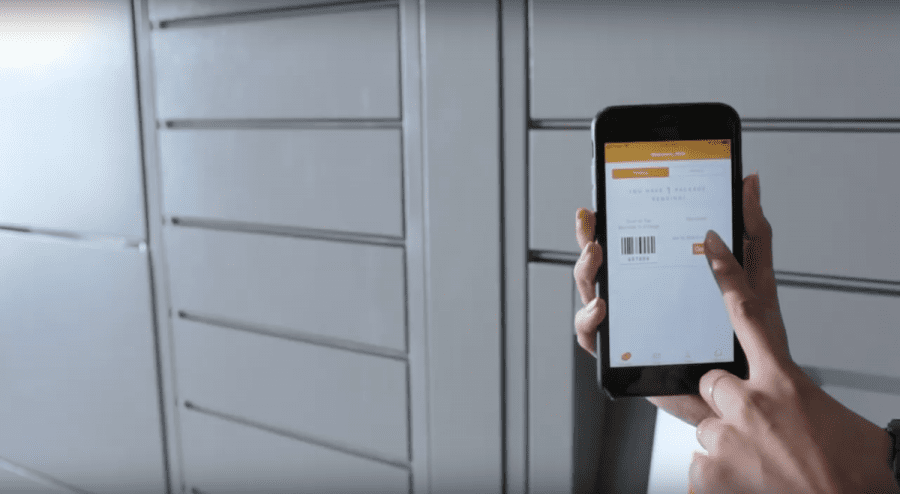
Archive
Multifamily Properties: It’s Time to Install Refrigerator Parcel Lockers
Written by: Parcel Pending
7 Min Read
Published: February 21, 2020
Updated: March 29, 2023
The meal kit and online grocery market has witnessed exponential growth in recent years, with no sign of a slowdown. This growth has come hand-in-hand with the complexities associated with delivering perishable goods. Whether the consumer lives in a single-family home or at a multifamily community, they expect their items to arrive fresh and ready to eat or cook.
The unfortunate dilemma for many property managers is that once a package arrives at the property, they are responsible for the items until they arrive at the resident’s specific unit. To avoid frustrated residents, more and more multifamily properties are investing in smart apartment solutions to manage the intake of perishable packages.
For a quick overview of how the meal kit and online grocery market is changing the way multifamily properties manage their package delivery process and how property managers can adapt to meet this resident demand, read on.
The DTC Meal Kit Trend: What Is It?
While the DTC (direct-to-consumer) meal kit market experienced slow market adoption when it first began, its value is expected to more than triple over the next six years.
There have been various developments in this sector that have major implications for the eCommerce industry going forward:
- While specific companies like Hello Fresh and Blue Apron dominated the industry for several years, Amazon has recently joined the fold with their purchase of Whole Foods Market in 2017, pointing towards even greater revenue growth in the industry moving forward.
- Since 2018, many major supermarkets have started providing customers with online grocery deliveries in addition to meal kit options, representing 60% of total growth in the market since 2018.
- Low-cost meal kit options have also increased since last year, further undercutting the market share of Hello Fresh and Blue Apron while leading to growth in the industry as a whole.
- Diet-focused meal kits are now being provided by several bespoke brands; Weight Watchers, among others, now offer their own customized meal kit
Meal kits offer customers a quick, healthy cooking option that can be tailored to their dietary needs, something that has increasingly attracted customers of varying ages and professions.
A major problem with meal kits is that they almost always require refrigeration, as they include all the ingredients the customer needs to prepare their meals during the week. For properties that lack a refrigerated package delivery system, this can mean accidentally spoiling a resident’s food for an entire week.
Online Grocery Delivery: What Is It?
Like meal kits, online grocery shopping did not take off initially and witnessed slow market adoption. Contrary to meal kits, the major reason for this slow development was that consumers were wary of purchasing perishable goods online. In recent years, this trend has reversed.
- In 2019, over 10% of American consumers consistently purchased their groceries via an online service, a now $600 billion market.
- From 2016 to 2018, the market doubled, with projections indicating that this trend will continue into the early 2020s.
Almost every major supermarket chain in the US now provides an online grocery delivery service, with many specialty, delivery-focused companies also operating within this sector.
Online grocery delivery provides customers with an efficient, hassle-free method of getting any food and beverage they want delivered straight to their home, with the added benefit of being able to order other household goods provided by the supermarket chain.
However, purchasing groceries online can also create problems for multifamily properties, as most orders contain at least some perishable items.
While many online grocery providers separate these products, this is unfortunately not always the case; this makes it even more difficult for those receiving the delivery to distinguish packages that require immediate refrigeration.
The Implications of Perishable Packages for Multifamily Properties
Many multifamily properties handle hundreds of packages a day either through a mailroom, smart package lockers or at the front desk. This can make it difficult to determine which packages require special treatment or expedited delivery.
There is a potential risk to consuming a meal kit or other perishable delivery that has been left out for too long. In fact, most meal kit or online grocery providers recommend immediate refrigeration or freezing upon delivery.
Because of these risks, the CDC has published specific guidance on how consumers should handle meal kits and perishable goods to avoid spoilage:
- Refrigerate the package immediately upon delivery
- Arrange for delivery when the customer is expected to be home
- If the customer is not home, indicate where the package should be placed (only a dry, shaded area where it is unlikely to spoil)
- If left out above 40°F for a long period of time, be sure to verify that the delivery has not gone bad
For multifamily properties, the responsibility of receiving the package may not lie with the resident; unfortunately, this forces the property manager to assume responsibility for the delivery and ensure that the meal kit is kept safe until the customer is able to retrieve their perishable package.
It’s Time to Install Refrigerator Parcel Lockers
Refrigerated parcel lockers can be a game-changer for any multifamily property. Not only can they protect a resident’s meal kits or online grocery delivery from package theft, but they are also useful for preserving meal kits or other goods that require refrigeration:
- Cold beverages or food deliveries
- Cosmetics
- Flowers
- Medications
- Other refrigerated items
Refrigerated locker systems are great apartment amenities and will provide significant benefits to any multifamily property that receives a large number of perishable packages. As e-commerce package volume continues to grow, managing a property’s deliveries can be difficult without a proper system in place. Some of the major benefits of installing a refrigerator locker system include:
- Mitigation of any potential risk associated with improper handling of perishable goods
- A simple package delivery and retrieval system
- Increased resident satisfaction within the property
- Decreased operational costs
Adding refrigerated locker services to a multifamily property alongside desirable lobby amenities can increase the value associated with leasing or owning a unit. As consumers quickly shift toward ordering perishable items for delivery directly to their door, installing a suitable package management system could drive millennial renters demand to lease at the property.
Parcel Pending’s Refrigerator Parcel Lockers
Parcel Pending was the first company to produce refrigerated lockers for multifamily properties. Our refrigerated parcel lockers ensure that a property can handle a large intake of items that need to be refrigerated, a necessity as the meal kit and online grocery delivery market continues to grow.
Parcel Pending is the leading provider of package management solutions for residential properties in the United States and Canada. With over 1.5 million packages successfully delivered monthly, we offer a wide range of solutions that ensure the simple and secure delivery and retrieval of packages and online orders, including refrigerated package lockers. Some of the major benefits of Parcel Pending’s refrigerator lockers include:
- Streamlined resident pick-up system using barcodes or Bluetooth functionality
- 100% deliverability by all courier services
- Energy-efficient system, decreasing operational costs
- No maintenance required due to an advanced anti-clog condenser coil
- Equipped with enhanced security systems, so residents can rest assured that their products are safe
- Smart technology systems that can detect when an item is placed in a locker
- Cooling temperature options from 35°F to 46°F
In addition, Parcel Pending offers an easy-to-use mobile app to help residents track the package delivery process. Pairing the refrigerator lockers with Parcel Pending’s mart parcel lockers will enable any multifamily property to handle a large delivery intake without requiring any additional package management system.
If Residents Don’t Have Access to Refrigerated Parcel Lockers…
If the property cannot install refrigerated parcel lockers, there are several things to keep in mind when handling perishable goods:
- Meal kit and online grocery providers should label all perishable items accordingly on the delivery box; property managers should check incoming deliveries for these messages and follow the instructions listed
- When a perishable item is received, property managers should check and see if the resident is home, then deliver the item immediately
- If the resident isn’t home, property staff should keep the package in the leasing office refrigerator or in a shaded, cool place out of the reach of any potential invader such as ants or rodents
- When handling an online grocery delivery, property managers should place all of the items in a refrigerator or cooled space, as some providers do not always separate perishable and non-perishable goods
- Property managers should instruct all staff to look out for meal kits or grocery deliveries, while also checking other packages for a perishable label
While investing in refrigerated parcel lockers is the easiest solution to the perishable package problem, following the guidelines provided will help properties who cannot install refrigerated lockers at this time.
Refrigerated Locker Guarantee
Installing refrigerated parcel lockers at a multifamily property will not only prevent package theft but also guarantee that perishable items are delivered in a safe and convenient way that will keep residents happy. With today’s fast-growing meal kit and online grocery market, residents are continually looking for housing options and amenities that meet their needs.
Contact Parcel Pending today for more information about our flexible package locker solutions, including refrigerated lockers!
And for more industry insights, stay on top of the trends with our Multifamily Marketing Ideas for 2020 and keep residents happy with our 9 Tenant Retention Ideas that Win Residents Over.
Sources:
Business Insider. Online Grocery Shopping Report 2020: Market stats and delivery trends for ecommerce groceries. https://www.businessinsider.com/online-grocery-report
CDC. Tips for Meal Kit and Food Delivery Safety. https://www.cdc.gov/foodsafety/communication/food-safety-meal-kits.html
Grocery Dive. Report: Online grocery sales grew 15% this year. https://www.grocerydive.com/news/report-online-grocery-sales-grew-15-this-year/562885/
Review Chatter. Meal Kit Industry Statistics, Facts & History. https://www.reviewchatter.com/statistics-facts-history/meal-kits
PR Newswire. Global Meal Kit Delivery Service Market Worth USD 8.94 Billion by 2025: Hexa Research. https://www.prnewswire.com/news-releases/global-meal-kit-delivery-service-market-worth-usd-8-94-billion-by-2025-hexa-research-300811555.html





